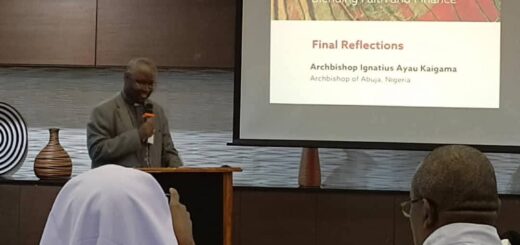Behold I am doing a new thing
by ARCH BISHOP · April 3, 2022
Fifth Sunday of Lent, Year C, Homily by Archbishop I. A. Kaigama, Abuja, April 3, 2022.
Readings: Is. 43: 16-21; Ps. 125 (126); Phil. 3: 8-14; Jn. 8: 1-11
Behold I am doing a new thing
Dear brothers and sisters, today, our journey of Lent has reached its fifth week. All our readings this Sunday offer us hope and remind us again of the compassionate and merciful love of God who forgives sins and desires not the death of the sinner who sincerely seeks forgiveness.
We hear the Lord saying: “I am doing something new in your midst…” (Is. 43:19). This message came to Israel at a time when they were in exile in Babylon, treated as slaves; denied the privilege of worshipping their God and were forced into the worship of alien gods, and were gradually losing their cultural heritage. The people recalled with soberness how they lived in freedom in Jerusalem; how Yahweh led them out of Egypt with a mighty hand; led them across the Red Sea, stood in front of them as the pillar of cloud by day and pillar of fire by night; led them to conquer great nations and brought them into the land of Canaan. They wondered if God had abandoned them and had become deaf to their cry of misery and oppression. The Psalmist gives us a clue to their lament: “By the rivers of Babylon we sat down; there we wept when we remembered Zion. On the willows nearby we hung up our harps. Those who captured us told us to sing; they told us to entertain them: “Sing us a song about Zion”. How can we sing a song to the Lord in a foreign land?” (Ps. 137:1-4).
After 70 years in Babylon, God used King Cyrus to release the Chosen people to return to Jerusalem. In the first reading from Isaiah, God promised a new dawn for His people Israel, a people that was “snuffed out, and put out like a wick”. The prophet tells the people, “No need to think about what was done before.” God would do a new thing in their midst.
In our second reading, St. Paul proposes the knowledge of Christ as the supreme good that we must pursue. Nothing can be compared to the advantage we have in Christ. Therefore, the Gospel acclamation invites us to “come back to the Lord with all our heart, for He is all tenderness and compassion.”
The Gospel presents the Scribes and the Pharisees bringing to Jesus a woman who was caught in adultery, expecting by the Law of Moses to have her stoned to death. If Jesus became merciful to her, they could accuse Him of going against the Law of Moses, and if He asked them to stone her to death (cf. Lev. 20:10, Deut. 22:23-24), they could still accuse Him before the Roman authorities for inciting murder. Jesus said to them, “let him who is without sin among you be the first to throw a stone on her” (Jn. 8:7). He bent down and began writing on the ground. St Jerome said He was writing the sins of the Scribes and Pharisees. At this point they began to leave one after the other and Jesus turned to her and asked, “Woman where are they? Has no one condemned you?” She said, “No one Lord.” And Jesus said, “Neither do I condemn you; go and sin no more” (vv. 10-11).
Adultery is a sin against chastity, a sin against the dignity of the sacrament of marriage and an injustice against one’s partner, but which has unfortunately become rampant in our time. It must be guarded against by both men and women.
The woman in today’s Gospel represents the many others who are treated with less dignity in our communities. Imagine, they made her to stand in the full view of everyone but could not do the same to the man who was caught in the act with her. While our society seems to tolerate the excesses of men, it hardly condones the slightest mistakes from women. This is seen in the imbalanced treatment reserved for women in our socio-economic and political life, not to talk of the cultural biases that subordinate women, an obvious demonstration of our inability even today to respect the dignity of the woman.
We learn from the readings today that God offers us divine justice which condemns only the sin, not the sinner (“neither do I condemn you, go, but sin no more”), as against human justice that condemns both the sin and the sinner.
God is offering us as individuals and as a nation His therapeutic, reassuring and warm welcome as the father of the Prodigal Son, so that we can move on with greater optimism, to turn a new leaf in our socio-economic, political and religious undertakings.
But in Nigeria, we seem to be graduating from the gruesome killings, kidnappings, the skyrocketing prices of goods in the market; the lingering fuel scarcity; the ASUU strike action, to the bombing of trains by terrorists and other criminal elements!
Who knows what, with our lackadaisical approach to issues we will wait until a plane full of passengers is brought down (God forbid) before we frantically set up investigation panels and committees which will definitely arrive at nothing.
We are desperately looking for divine transformation in this country. To obtain it, we must put behind us our bitterness, hostility towards one another, let go of the wounds of the past and like St. Paul, “strain forward to what lies ahead” (Phil. 3:14). We must admit that we “all have sinned and fallen short of the glory of God” (Rom. 3:23). Let us judge less and love more. We need to remove the plank in our own eyes so that we can see clearly enough to remove the speck in our neighbour’s eyes (cf. Mt. 7:5). Let us learn to admit when we are at fault instead of the blame game or senseless rationalization of sins and offences, or even claiming that “it is the work of the devil!” The woman that was caught in the very act of adultery accepted the undisputable fact that she was a sinner in need of mercy. Let us learn to be merciful and compassionate to one another. We must avoid the self-righteous mentality and the judgmental attitude to others when God is calling them to conversion instead. We should seek to outdo one another in love rather than hate, forgiveness rather than revenge and embrace each other in the spirit of a common humanity. We are all brothers and sisters (fratelli tutti).
Despite all our current predicaments, we are comforted that weeping may endure through the night, but joy comes in the morning (cf. Ps. 30:5). This can happen only with genuine prayers, good leadership, transparency, accountability, sincerity of purpose, selflessness and dedication to service. If we practise these, God will do something new in Nigeria.




